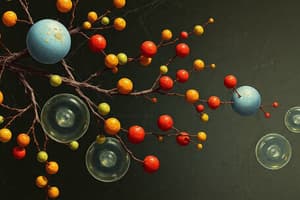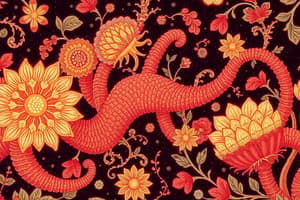Podcast
Questions and Answers
What is the primary function of carbohydrates in living organisms?
What is the primary function of carbohydrates in living organisms?
- To support the structure of cell membranes
- To provide energy for cellular processes (correct)
- To facilitate nerve impulse transmission
- To regulate body temperature
How do plants synthesize carbohydrates?
How do plants synthesize carbohydrates?
- Through fermentation using organic compounds
- Through photosynthesis using carbon dioxide and water (correct)
- Through glycolysis using sunlight
- Through cellular respiration using glucose and oxygen
What happens to the monosaccharides after resorption in the gut?
What happens to the monosaccharides after resorption in the gut?
- They are released into the bloodstream directly
- They are transported to the liver through the portal vein (correct)
- They are converted to proteins in the stomach
- They are broken down by intestinal bacteria
What happens to non-glucose monosaccharides in the liver?
What happens to non-glucose monosaccharides in the liver?
What are the end products of cellular (aerobic) respiration of glucose and oxygen?
What are the end products of cellular (aerobic) respiration of glucose and oxygen?
What is the primary form in which animals and plants store the energy derived from carbohydrates?
What is the primary form in which animals and plants store the energy derived from carbohydrates?
Which process allows plants to synthesize carbohydrates from carbon dioxide and water?
Which process allows plants to synthesize carbohydrates from carbon dioxide and water?
What is the fate of non-glucose monosaccharides (fructose, galactose) in the liver?
What is the fate of non-glucose monosaccharides (fructose, galactose) in the liver?
What are the end products of cellular (aerobic) respiration of glucose and oxygen?
What are the end products of cellular (aerobic) respiration of glucose and oxygen?
What are the primary monomers into which complex carbohydrates are broken down during digestion?
What are the primary monomers into which complex carbohydrates are broken down during digestion?
Flashcards are hidden until you start studying




